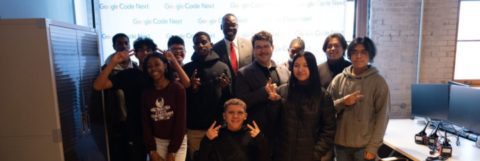Michigan Chronicle
Sherri Kolade
March 5, 2023
Asim Williams, 23, is responsible for creating learning opportunities for kids between the ages of 13 and 18 to boost enthusiasm, self-assurance and fundamental abilities needed to pursue a career in computer science.
As the Google Code Next coach in Detroit – a free, computer science education program that meets local Black, Latinx, and Native high school students in their own communities and provides the skills and inspiration they need for computer science-related fields – he is etching out a creative, technological path for those coming behind him.
Detroit, among other select states, is filling the need by offering coding boot camps and other training programs that teach the skills necessary to establish profitable careers in coding.
“[This program] develops students’ interest in STEM to invent technology that really improves people’s lives,” Williams told the Michigan Chronicle. “Underrepresented people need to be a part of those processes where technologies and where decisions are being made.”
The Detroit native studied computer science and did internships with Google and said that his professional experience and upbringing (he relocated throughout the United States) brought him back to his city, which he described as having “incredible potential” technologically, historically and beyond.
He added that Detroit represents a city predominantly where opportunities have been restricted from Black communities and to be able to experience technological education like that of Code Next “really goes a long way.”
The only group of its kind in the Midwest, a new cohort of students in Google’s Code Next program in downtown Detroit is encouraging young, aspiring technology leaders to imagine what is possible for their careers and futures, and state leaders are taking note.
For Black, Latinx, and Native American high school students, Google Code Next is an all-encompassing computer science education program that provides after-school and Saturday programming to prepare them for this in-demand field and potential future careers.
There are more labs in Harlem, N.Y., Chelsea, N.Y. and Oakland, Calif.
The 20-student new class offers access to state-of-the-art tools, live coaches, and classes on UX design and JavaScript development. The lab offers programs and curricula that are focused on the future of mobility, from self-driving automobiles to drone racing. The students get to interact with other kids their age from different backgrounds who are passionate about coding.
“Exposing young people to technology gives them more than skills—it gives them the confidence to know that they can build whatever they can imagine,” said Lt. Gov. Garlin Gilchrist II. “The students I met at Google’s Code Next at The Factory at Michigan Central in Detroit this afternoon are already creating impressive applications. I know that every child in this program will be positioned for success in their educations and their careers.”
Gilchrist formerly had a profession in the field of computer science and technology, which he has been passionate about his entire life.
Along with Ford, Google was one of Michigan Central’s first founding members. Through the Grow with Google and Code Next programs, Google will support Michigan Central and Detroit’s job preparation mentoring and training initiatives.
Google has a long history of supporting computer science education in Michigan, working with local organizations including SMASH Detroit, TechSlam Detroit, and Detroit Public Schools. Google has proudly called Michigan its home for more than 15 years.
More than 90% of the most recent 12th-grade graduates of the program accepted and enrolled in college or higher education programs. Most of the students who recently completed 12th grade are majoring in a STEM (science, technology, engineering, and math) discipline in college.
Students in grades 9 through 12 who reside in the lab’s vicinity can participate in programming that ranges from rigorous coding to entrepreneurship.
Williams said that there are currently 49 students who are “elated” to be part of a learning environment and socialize with their peers also interested in science, technology, education, and math-related activities.
“We take a lot of pride in emphasizing [that this classroom] is their space to learn to become engineers, makers and entrepreneurs – it gives them a sense of ownership in their city and sense of urgency to be problem solvers in Detroit.”
Code Next student Destiney Williams, an 11th grader at Renaissance High School, told the Michigan Chronicle that her passion for technology grew over time, especially in the world of games.
“I really enjoy [it], especially since we now have a game design course at Code Next,” she said, adding that she hopes to go into computer science programming in college and study more about how computers work and potential programs and similar topics including artificial intelligence.
Code Next, she said, is a bridge to help her get there, and if she can do it others her age can too.
“I didn’t exactly know what I was getting myself into when I applied [for Code Next]. I’m very glad I did it,” she said of not having any prior experience with technology even though she knew that’s what she wanted to major in. “So, that being the first introduction was really a great experience and great introduction to technology.”

